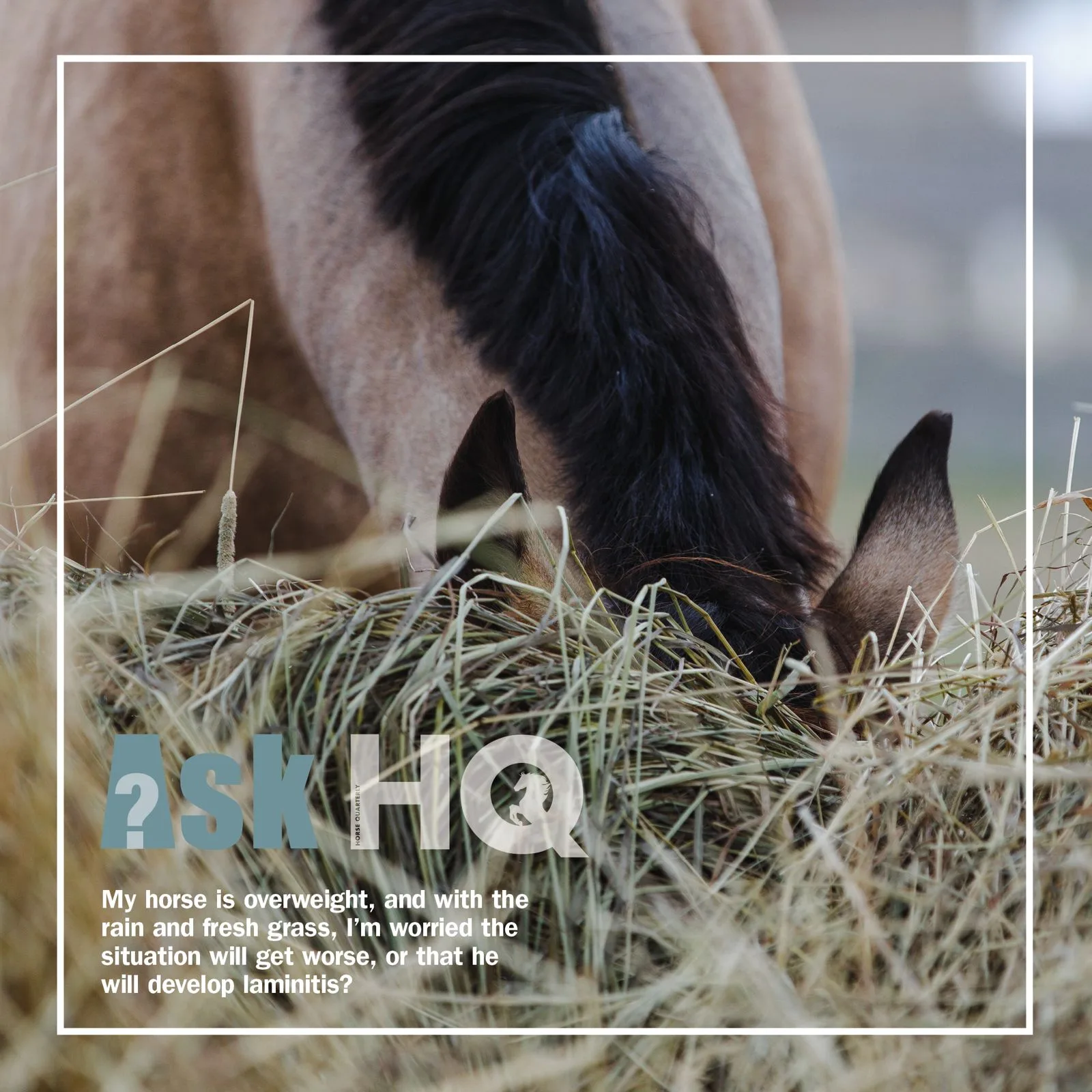Q: My horse is overweight, and with the rain and fresh grass, I’m worried the situation will get worse, or that he will develop laminitis?
A: Maintaining a healthy weight is crucial for your horse’s overall well-being, as obesity can lead to serious health issues like laminitis, joint problems, and metabolic disorders. If you’ve noticed your horse is carrying excess weight, there are several steps you can take to help them shed those extra kilograms in a safe and effective way. Here are some important strategies:
- Consult your vet
Before starting any weight-loss programme, it’s a good idea to consult your vet. They can assess your horse’s overall health and determine if there are any underlying conditions (like Cushing’s disease or insulin resistance) that could be contributing to weight gain. They can also help you set realistic goals and provide a tailored plan.
- Adjust the diet
Changes to the diet should be made gradually and ideally under consultation with your vet or equine nutritionist.
Reduce calories: One of the most effective ways to help your horse lose weight is by cutting back on their caloric intake. If you’re feeding concentrate, reduce the amount or consider switching to a balancer. Always ensure that the primary source of nutrition is hay, which is high in fibre but lower in calories.
Choose the right hay: Not all hay is equal. Good-quality grass hay is lower in calories than legume hay (like lucerne). When choosing hay, opt for grass hay with a low sugar content. If your horse is prone to laminitis or has metabolic concerns, ensure the hay is not too rich in starch and sugar. You can also soak hay for an hour or so before feeding it to reduce sugar content. NOTE: Horses should have access to hay 24/7 to maintain their gut health, even if they are on a weight-loss programme.
Use slow-feeders: If your horse tends to eat too quickly, or if you need to restrict their intake, a slow-feeder or hay net with small holes can help. This encourages the horse to eat slowly, which can keep them satisfied for longer while consuming fewer calories.
- Exercise more
Increasing exercise is key to helping your horse burn off excess calories. Start with moderate exercise and gradually increase the intensity and duration. Keep in mind the horse’s age, fitness level, and any pre-existing health conditions.
Cross-train: In addition to riding, include a variety of activities such as lunging, long lining, hacking or groundwork. For horses that are not yet in regular work, building up to daily exercise with consistent, low-impact activities can be helpful. As your horse gets fitter, consider adding more challenging work like hill work or short bursts of canter.
- Control access to lush grazing
Pasture access can sometimes be a hidden source of excess calories, especially in the warmer months when grass is rich in sugar. If you have access to a lush pasture, limit grazing time and consider using a grazing muzzle. This allows your horse to eat slowly and helps reduce the amount of grass they can consume. Alternatively, you can strip graze, where you rotate grazing areas to prevent overconsumption of rich pasture.
- Ensure access to fresh water
Sometimes, horses that are losing weight or on a restricted diet may drink less water. Ensure that your horse always has access to fresh, clean water. This is especially important if they are working harder or if they are on a higher-fibre diet, which requires more water to aid digestion.
- Monitor weight regularly
Regularly monitoring your horse’s weight is important to track progress and ensure they’re losing weight at a healthy pace. You can use a weight tape or, for more accurate measurements, weigh your horse using a scale. Keep a record of their weight so you can make adjustments to their diet or exercise programme if necessary.
- Be patient
Weight loss in horses, as with humans, takes time. Avoid drastic measures that could harm your horse’s health. Rapid weight loss can lead to muscle loss and other health issues, so it’s important to set gradual, realistic goals. Aim for a steady, consistent reduction in body condition over several months rather than quick fixes.
Key takeaways:
- Consult a vet to rule out any underlying health conditions.
- Reduce calorie intake by limiting high-energy feeds and choosing lower-calorie hay.
- Increase exercise gradually to help burn off excess weight.
- Monitor weight regularly to ensure the plan is working.
- Control pasture access by using grazing muzzles or limiting grazing time on rich pasture. [end box]
By combining a carefully controlled diet, regular exercise, and patience, you can help your horse shed excess weight safely and effectively. Keeping your horse at a healthy weight not only improves their quality of life but also reduces the risk of long-term health problems.


